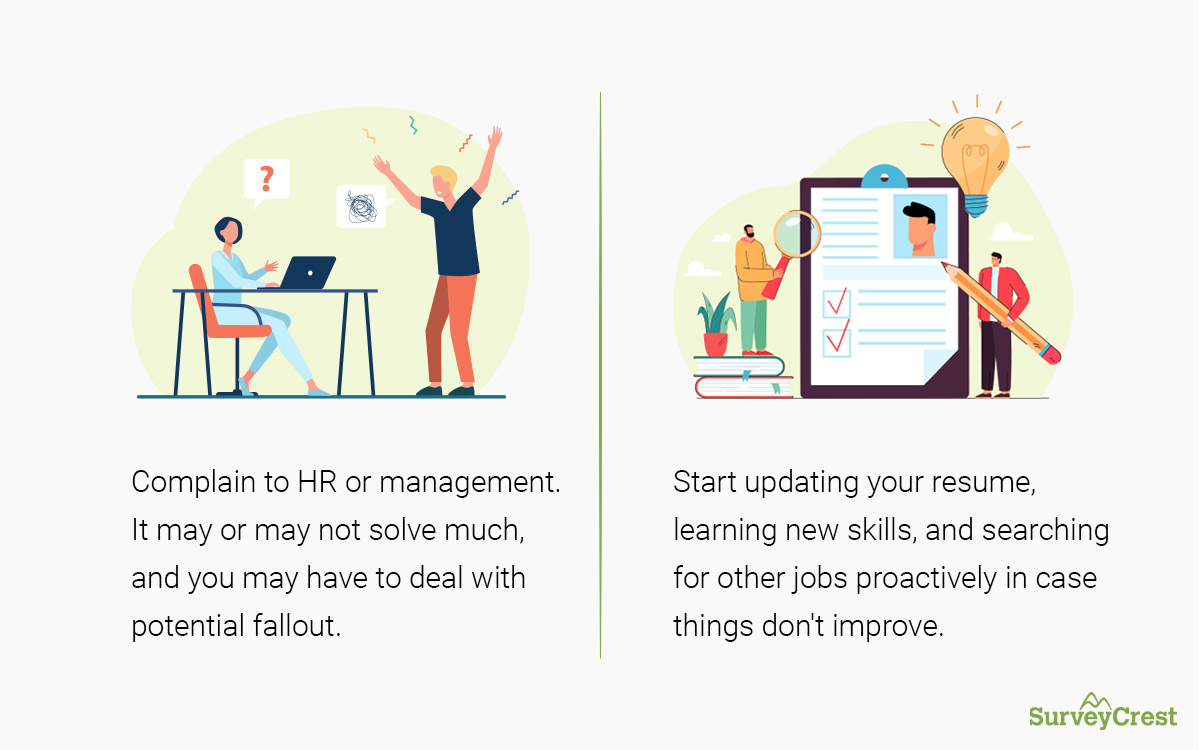
Photo Credit: iStock.com/RichVintage
Good bosses are like good exes — few and far in between.
But bad bosses? Dime a dozen. We all had one, worked with one, and cried with joy when we got the chance to leave.
But what about those unfortunate among us that are still with their bad bosses? In a culture, where employee satisfaction is a thing unheard of?
We dedicate this article to helping them navigate this tortuous path, keeping a sane head on their shoulders, and focusing on the light at the end of this dark, depressing tunnel.
In an ideal world, you will have 20 job offers lined up at any given moment so you can reclaim control of your professional life and leave a toxic environment.
But in the real world, we mostly have to make the best of things, and exploring the following strategies allows you to try doing that with your difficult boss.
See what is driving their difficult or toxic behavior. A boss with micromanaging tendencies is difficult to please and may make the employees think that they are not trusted in the workplace.
But a conversation with the boss may reveal that they are only afraid of losing control, or prefer how they want things done.
So, when you start to feel that your interactions with your boss are becoming problematic, take a pause and observe what’s happening. If a huge project deadline is looming, and everyone’s on edge, perhaps you can forgive your boss for being a bit more demanding. Especially if they haven’t displayed this behavior in the past.
Your boss could also be feeling more under pressure due to work or personal things.
So, when you are observing, try to think of the most forgiving reason for their behavior. Pair that with consistently good work from your end, and hopefully, the bad patch will fix itself without any escalation.
I know you may not want to hear it, but the grownup thing to do is to always look inwards and take stock of what you are doing.
If the difficult trait of your boss is that they require everyone to be punctual and you’re often late showing up to work or taking extended breaks, perhaps the fault does not lie with your boss.
Checking your behavior and improving what you can, not only ensures personal growth but may also go a long way in improving your working relationship with your boss.
Display leadership behavior and instead of solely focusing on your given tasks, see what you can do to support your boss in their success as well as work around their shortcomings.
If your boss is disorganized or forgets important dates, stay a step ahead and set up sheets and reminders that ensure your boss remains up to date.
If your boss is a poor communicator, ask them questions so they have an opportunity to expound and clarify their feedback to you.
Doing so will help a good-intentioned difficult boss to begin seeing you as a high-potential asset and will help smooth out things between you two.
If your boss is not toxic and simply inefficient or has a different communication style than you, see if an open talk with them can solve anything.
Tell your micromanaging boss that this is putting a strain on you and makes you feel like you are not trusted to do your job. By clearly voicing your concerns, you give both of yourselves a chance to air grievances (exchange feedback) in a healthy, professional environment and perhaps come to a solution.
When you go and talk to your manager, though, make sure to not be accusatory. Instead, empathize with their position, and focus on how the culture is affecting the bottom line. When you quote numbers — reduction in productive hours, low team morale, and high team turnover — you have more chances of being heard and taken seriously.
If you have done all these grownup things and issues still exist or keep escalating, it’s time to look around and know for sure if you are a target or if this is your boss’ typical behavior.
If it’s the former, there isn’t much you can do, except for two drastic way-outs:

But if you are not ready or willing to leave (especially if it’s a good work opportunity), or this is your boss’ typical behavior, the safest route for you is to focus on your work, keep your head down, and find support elsewhere.
A mentor within the company, a group of co-workers, or someone outside the work but within the industry so you can continue learning professionally and not let your toxic boss mar your passion.
As emotionally draining as it can be to work with a difficult boss, it’s critically important to surround yourself with support and don’t isolate yourself in this experience.
Your work is your personal brand and it goes beyond your current job. So, no matter how angry or driven you feel to cut corners, do not.
If your boss is truly out to get you, use your good work ethic to make it singularly difficult for him.
So, remain positive, arrive on time, do your best work, and keep yourself engaged at work as much as you can without pressurizing yourself.
It isn’t enough to do a good job when you are dealing with a difficult manager. They may find little things to criticize you about and post unhelpful feedback.
So, your job is to anticipate your boss’ usual critique and trigger-proof your work against that. In other words, adapt the way you work to suit your boss’ preferences.
For example, if your boss wants article edits in a Google doc with all the changes highlighted, follow that regardless of how poorly formatted it makes the article look.
Remember, when you are working with someone who wants things done a certain way, it’s best to choose your battles wisely, and often ask yourself: is it (the argument) worth it?
Usually, it isn’t. So, do the work the way they want, and move on to the next task (or a better boss).
If you think you have a difficult boss, the rest of your teammates likely think so, too.
So, broach the subject carefully and get a feel of how your coworkers view your boss’ work style. If they are as unhappy as you are, you might find support with them.
Together, you all can perhaps find a more permanent solution for the issue, or at least form healthy work bonds where the in-team environment is protected from internal politics and negativity.
Don’t let your toxic boss win by going into your shell and feeling indifferent about your achievements. It’s a testament to your outstanding abilities that you are still able to produce excellent work while being surrounded by criticism and feeling inadequate.
So, protect your mental health, celebrate the workplace wins you get, and use them to propel your energy to more worthwhile endeavors.
Toxic cultures do not improve overnight. If your workplace is enmeshed in one, it’s unlikely that one person’s efforts will uncomplicate much. So, try to apply everything we’ve discussed here but work on your exit strategy on the side.
Keep your resume updated, network with others in the industry, and prepare your plan B.
When the difficulties with your boss begin to turn toxic, your exit strategy will help you leave on a strong note.
In truly problematic work environments, finding support with even your coworkers may not be easy. People may be scared to open up, and even if they do, their experience of the boss may be totally different from yours.
So, instead of just withdrawing from everyone, look for support opportunities among your friends, family, and loved ones.
Share your concerns with them and trust them when they tell you that you’ve done enough and maybe it’s time to leave. A conversation just like that with my best friend was the exact push I needed to leave a toxic work situation and find something better.
Ultimately, dealing with a difficult boss comes down to one thing: knowing when to quit. If you think it’s becoming a bit much, focus on your exit strategy and get the hell out of there.
Kelvin Stiles is a tech enthusiast and works as a marketing consultant at SurveyCrest – FREE online survey software and publishing tools for academic and business use. He is also an avid blogger and a comic book fanatic.